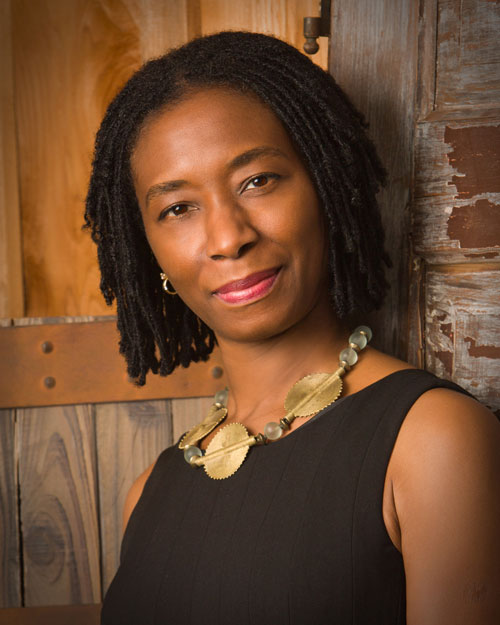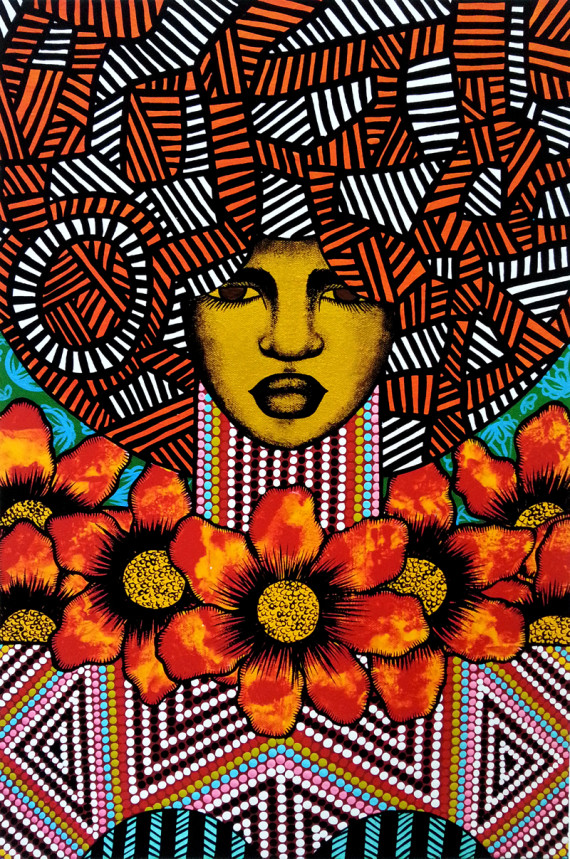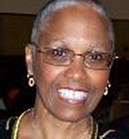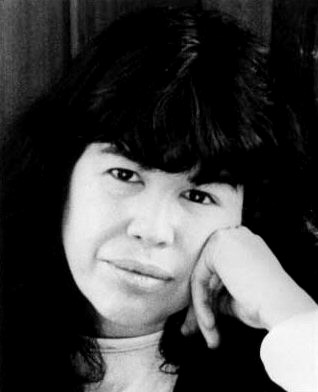The lighting in the department store reminds her of hospitals. She walks through the entrance ignoring the display, a Plexiglas table on top of which are vases in shades of orange, yellow and green. On both side of the table are white mannequins in floral summer dresses. She barely pays attention to them, either. She is thinking of her mom. In particular, of how she waited in hospital receptions for her mom to come out of maternity wards when she was a girl. Her mom, who still works as a nurse in New Jersey, lives in an apartment in Hackensack, about twenty minutes away by car. She has driven from Pennsylvania to see her mom at home today, and is dreading the visit, which is partly why she has stopped at this mall on Route 4. She also hopes to find a handbag she has been looking for.
She heads for the general handbag section. She has never been interested in bags with logos, “the Cs, Gs, Fs and LVs,” as she calls them. Their departments are almost identically ordered. Their bags are in compartments on their back walls, and their wallets and other accessories are in sales counters further up front. One department has a gray carpet; another, laminated flooring that resembles black and white tiles. Louis Vuitton has what looks like hardwood flooring, with a vintage malle cabine across from the till.
The assistant in the general handbag section is a blonde with a well-rehearsed smile.
“Can I help you?”
“I think so.”
She points at a black, leather tote bag with a crisscross weave.
The assistant widens her eyes. “Oh, I love that bag! I wish I could afford to buy it…”
“Me, too,” she says.
Another assistant may not have been as candid, or may even have ignored her. With her skinny jeans, cropped T-shirt and hair weave, she could be any twenty-something black woman. There is no way of telling that she works for a Big Four accountancy firm as a consultant and provides advisory services to Fortune 500 companies. Or that she earns a six-figure salary, even as her credit score has recently dropped because she has maxed out all her cards. Her first name, Grace, grants her a generic black pass as well, but not her Yoruba last name, Oladimeji.
The assistant strokes the bag before handing it to Grace. Grace cradles it and runs her hand over the weave patterns. The texture of the bag tingles her fingers and the smell of new leather gives her a sensation similar to a head rush.
“It’s beautiful,” the assistant says.
“It is,” Grace says.
“It will stay with you forever.”
“It will.”
“Would you like me to wrap it up for you?”
Grace clutches the bag. “Please give me a moment to think about this.”
The assistant flops her wrist. “Oh, take your time, honey. You have plenty of time. Walk around for as long as you want and I’ll be here. I’m not going anywhere soon and it’s all right to have second thoughts. Buying a bag like this is a lifetime commitment.”
Grace hands the bag back to the assistant who perhaps meant to say investment instead of commitment. She could invest the money she is about to spend on the bag, but she can’t be committed to one bag when she has others. Besides, she will soon see another, obsess over it and might even travel this far to find it.
“Thanks,” she says to the assistant. “It won’t take me long.”
She would like to think she and the assistant have had a genuine connection. She would even want to believe the assistant would be partial to her if another shopper comes along and wants to buy the same bag. She panics as she walks away, hoping it will still be available when she returns.
She prefers to shop online. Shopping online gives her some degree of anonymity and control.
She can also return an item she is not satisfied with simply by filling out a form and arranging a UPS pickup. But she uses her debit card to shop now, which might be a problem if she goes back to the convenience of shopping online. She can’t help herself. She will only further ruin her credit.
She heads for the shoe section and ends up at the sales racks, where she chooses a pair of black-and-white-striped Italian-made flats. She crouches as she struggles to put them on and nearly tumbles over when an assistant in a tight-fitting black suit approaches her, his dreadlocks pulled back in a bun.
“Are you OK there?” he asks.
“Yes,” she says, sounding breathless as she straightens up.
“You could sit, you know.”
She smiles apologetically. “I know.”
He studies her feet. “They look kind of snug to me. You might want to go a half size up.”
“They’re my size, actually.”
“The fit is narrow.”
“I’m all right with that.”
He lifts his forefinger. “Well, if they’re comfortable on.”
She pulls off the shoes by their heels as he walks away. For a moment she considers leaving them on the floor in retaliation, but she picks them up and returns them to the rack. She has worked as an assistant in a shoe store before and would get mad whenever customers left shoes they’d tried on lying around.
She was born in Nigeria. She and her mom immigrated to America when she was two years old. According to her mom, they left Nigeria because her father became a polygamist after he received a chieftaincy title. He married a second wife who had a son by him, and from then on neglected Grace and her mom, even though he could afford to take care of both families.
The idea of having a chief for a father was too remote for Grace to grasp when she was a girl, having never been back to Nigeria. Her mom had no photos of him, but once in a while would look at Grace’s widow’s peak and say, “You look just like him.” Grace had watched Coming to America, her only frame of reference for the customs of African royalty. She imagined her father dressed like Arsenio Hall in the movie, in a suit and a Karakul cap. Her mom referred to him as a businessman, which at first surprised her because she had thought his job was to be part of a king’s entourage. When she was old enough to ask for details, she found out he imported electronic goods from England and sold them in Nigeria. He owned a storied shopping plaza in Lagos, and his electronics store took up the entire ground floor.
Grace and her mom had lived in Teaneck before they moved to Hackensack. She doesn’t remember their apartment in Teaneck. She went to day care there while her mom worked in retail and studied for her nursing exams. She attended elementary school in Hackensack when her mom started working as a nurse. Once her mom bought a car, they would drive to the mall every weekend. She hated the mall back then. She would get bored waiting for her mom to browse stores, but she enjoyed the cinnamon buns and lemonade her mom bought her at the food court. She loved the lights in the mall at Christmastime, especially. Apparently, she was scared of Father Christmas, as her mom calls Santa Claus, but she doesn’t remember that.
She didn’t care for the mall until she was in middle school, where she was teased for being a nerd and having nappy hair. She would eagerly go to the mall with her mom, who would give her enough money to buy cheap, shiny trinkets. Her mom bought her her first music CD, The Miseducation of Lauryn Hill, at the mall and they would sing along to it in the car. She started going to the mall on her own when she left middle school for a Catholic high school in Paramus. Sometimes she met her best friend, Ashley, there. Ashley’s parents were from the Philippines and they owned a family grocery store. She and Ashley had a play rivalry over which moms were pushier, Asian or African moms. She was one of a few girls in school who were not dating. Her mom, as if to encourage her to stay that way, would give her money to buy make-up, perfume, jeans, T-shirts, anything she wanted from the mall.
There was a time in middle school when Grace was of the impression that shopping on weekends was the American way of life and all she needed to aspire to. In high school, she became cynical about shopping. She bought Kanye West’s CD, The College Dropout, and listened to “All Falls Down” over and over, as if the lyrics were written for her: she was a single black female and she was addicted to retail. But the mall, for her, was more an escape from home now. She knew her mom took Prozac because of the stress of work. She could cope with her mom taking Prozac until her mom began to take Xanax as well.
She walks through the perfumery section, passing Hermès, Ferragamo and Marc Jacobs perfumes on glass shelves. She wears Marc Jacobs’ Daisy. She has never stopped to try Jo Malone of London perfumes, but the bottles always grab her attention. There is a display of samples labeled Citrus, Fruity, Light Floral, Floral and Woody. The perfumes range from clear to yellowy tones. A brunette assistant in a leopard-print dress and coral lipstick holds up a bottle of some other perfume, but Grace shakes her head and passes her.
The cosmetics section resembles a collection of giant artist palettes. Bobbi Brown has a few customers, MAC has more than a few. Chanel has a whole department, which is empty but for a middle-aged woman in a white linen pantsuit, and an assistant dressed in black. Kiehl’s has a skeleton in a bow tie and a doctor’s coat. Grace stops to try a hand lotion as she reconsiders buying the bag. She really doesn’t need another bag, but having this one would say of her that she is stylish rather than fashion conscious. That she is confident enough not to care about making a fashion statement.
Her reasoning amuses her. How pathetic is that? she thinks, rubbing her hands together until the lotion is absorbed.
Her mom initially mixed with other Nigerians in America, but ended up falling out with them. The women were gossipy and competitive, she said, and the men would use and abuse women, if they could. Grace didn’t meet many Nigerians her own age until she went to college. Most of them were American-born children of immigrants, a handful of whom had attended private schools because their parents were in law, medicine and other such professions. To her, the private-school kids were privileged and bound to end up in an Ivy League college, but they complained about not being eligible for financial aid, as she was. She also met Nigerians from Nigeria, who had been educated partly there and partly in English boarding schools, or “public schools,” as they called them. They had been all over Europe. They traveled to London in the summer and to Lagos for Christmas. They planned to return to Nigeria after they graduated.
One of them asked why her name was Grace. She asked why he wanted to know. He said his housegirl in Nigeria was called Grace, and only housegirls had names like Grace, Mercy, Patience, Comfort and Joy. “I am Catholic,” she said. She ignored him after that, but she made friends with other Nigeria-Nigerians who were on her business program. They were called Tara, Lali, Kit and Zak. Their names had been shortened: Tara was Omotara, a Yoruba name. Lali was Alali, a Kalabari name. Kit was Akitoye. He, too, was Yoruba. Zak was Zakaria. He was Hausa, but his name was Arabic. She would have dinner with Tara and Lali now and then, but when she suggested they all go to a Senegalese restaurant for dinner on Nigeria’s Independence Day for an African night out, Kit said that was un-Nigerian. “We don’t do the motherland thing there,” he said. “You lot here are setting us back.”
She warmed to them because she was a Britophile. She read British literature and watched British movies. Kit was like a Nigerian Oscar Wilde because he had that cutting-wit persona going for him. Tara’s posh English accent reminded her of Agatha Runcible’s in the movie Bright Young Things, though Tara denied it. They all walked around as if they belonged wherever they went. She wasn’t ashamed of being Nigerian, but she wished she had their worldliness and unconscious pride. During Thanksgiving break, she asked her mom, “How come you didn’t tell me about Nigerians like them?” Her mom sniffed, as if they were beneath her. “I never mixed with Nigerians like them.”
She takes the escalator to the second floor and looks down on the fine-jewelry section. She has a pair of diamond stud earrings, but other than that she doesn’t wear jewelry. Her mom used to buy gold jewelry, earrings, necklaces and bracelets, though her mom often said 14-karat gold was American and Nigerians preferred 18-karat gold.
Upstairs she passes a male assistant with spiked hair talking to a teenage girl with a purple rinse.
“Your hair color will go with anything,” the assistant says.
“Yeah,” the girl says.
“Look at it this way,” the assistant says, with a laugh. “It has to.”
“Yeah,” the girl says, smoothing her hair back.
Grace thinks about the assistant in the handbag section who had won her over the same way. Their selling method is like indoctrination. She has recently been paid, so she has enough money for the bag, but she won’t have much to spend after she’s paid her rent, car lease, credit-card payments and other bills. She definitely won’t be able to eat out this month if she buys the bag, and eating out is all she ever does to socialize these days. Spending nights at home watching television would be miserable. She wishes she had a dog. She has always wanted a dog. A small, cute dog like a Lhasa Apso or a Yorkie. But at the same time she’s glad she’s never had one. She can’t imagine having to give a dog away because she is in a financial mess.
When she was in college, she was sometimes too broke to go out with Tara and Lali. They would eat at restaurants she couldn’t afford to eat at. She did odd retail jobs on the weekends to make extra money. Tara and Lali didn’t work. They didn’t have to, and they had visa restrictions. Her jobs gave her reasons to turn down their invitations, but whenever she had enough money, she would go out with them. All she’d ever heard about Nigeria on the news was that it was a country with email scammers and corrupt leaders. By her mom’s account, Lagos was the same filthy, congested city it was when they left, and if they returned, they would be robbed of their belongings and blown up by Boko Haram.
Tara and Lali just talked about the Nigerian social scenes in Lagos and London. In London, there were Nigerian hangouts. She found it weird when they referred to Nigerian students there as rich kids. Perhaps those students were children of billionaires. Tara’s last boyfriend was one. His mother was an oil dealer. He was sweet in private, Tara said, but she broke up with him because he was embarrassing in public. He would reserve tables in clubs and order champagne like some hard hip-hop mogul when he was just a spoiled brat who had never taken public transportation. In Lagos, there were one or two clubs, but they went out of fashion pretty quickly, so friends got together, hired halls, Afro hip-hop MCs and sold tickets. Afro hip-hop was huge in Lagos, but once in a while American hip-hop MCs and R&B singers flew in for concerts. Chris Brown and Rick Ross had recently been there.
Of course, she, Tara and Lali talked about guys. She learned that Nigerians like them didn’t have random hookups because they had to be careful about their reputations. Everyone knew everyone and parents talked. They asked what sort of guy she was into and she said, “He would have to be black and he would have to be smart. Sorry, but I can’t deal with a dumb pretty boy.” Lali asked, “Why does he have to be black?” Lali had an angular face with a permanently inquiring expression. “I don’t look at other races that way,” Grace said. “Why not?” Lali asked. “I just don’t,” Grace said and shrugged.
Lali was always involved in organizing panels on student diversity and student rights, perhaps because she’d had some schooling in America. She went to a boarding school in England called Wycombe Abbey, but her parents, who had attended college in America, wanted her to get into the American system of education sooner, so she left Wycombe Abbey for Exeter.
Tara had only dated Nigerians, but she had all these standards they had to meet. They had to be well-educated and well-spoken. They couldn’t be too Nigerian. She couldn’t take too Nigerian. Tara had dated Yoruba guys, mostly. She did not date other Africans. She would definitely not date an African-American or a West Indian. “They would probably not want to date you because you’re African,” Lali said. Tara’s accent immediately turned Nigerian. “And so?”
Tara had dimples and one of those likeable faces that, no matter what came out of her mouth, you forgave her. She kept saying, “And so?” as Lali repeatedly called her stuck-up. Grace laughed so hard she was in tears. She had never met anyone as unapologetically prejudiced as Tara. Lali would date anyone. She had a thing for Chinese guys with tans.
With Kit and Zak, Grace became their go-to person for insights African-American. They both thought Americans were overly preoccupied with racial issues. Kit said racism was clearly a sign of stupidity so it ought to be ignored. Zak couldn’t understand the fuss about the N-word because it was used freely in rap. They refused to listen to any talk about charity in Africa, though. Once, when she brought up a charitable cause relating to Africa, Kit called charity a racket and Zak said he was sick of celebrities using Africa to improve their image. Kit could be arrogant and Zak was a bit on the quiet side. They were both into European girls. They didn’t think that was a big deal. Grace didn’t either. She didn’t want them, so anyone could have them, but she did wonder why, if they were so international, they only went for European girls.
She reaches the casuals section on the second floor and admires the view as if it is an architectural design. There are rails of black and white clothing, rails of clothing with muted colors like beige and gray, and others with striking colors she guesses are called citrus yellow and peacock green. Why is she ashamed of shopping? Why does she see shopping as a senseless activity? The signs for Splendid and Theory labels remind her of poetry and philosophy. The perfume and cosmetics sections downstairs reminded her of chemistry and art, and the Louis Vuitton department of language and history, when she saw the vintage malle cabine.
I’m so fucked, she thinks.
In college, she met a guy called Peter who was in his second year of engineering. Peter’s parents were pharmacists and they were from Nigeria. They were Bendelites. He explained that meant they were from somewhere in the midwest of Nigeria. They had immigrated to America in the 1980s and Peter was born and raised in Mississippi. His family was messed up, more messed up than hers, so messed up she could tell him about her mom taking pills. His parents were strict Catholics and Republican. They voted for George Bush, supported the war in Iraq and were convinced President Obama was Muslim.
She was too scared to ask if they were Birthers, but from what Peter told her about them, they were the sort of African immigrants who considered it a privilege to be seen as good blacks. To her, they were patronized. Peter must have thought so as well because he rebelled against them. He’d played baseball in high school until he got too friendly with some blue-eyed cheerleader whose dad found out. The man threatened to shoot him. Instead of reporting the man to the police, Peter’s parents asked if Peter had fornicated with his daughter. “I mean,” Peter said, “what happened to thou shalt not kill?”
His parents never reported the incident because the man worked for the mayor’s office. They hoped Peter would stay out of trouble for the rest of high school and get a baseball scholarship to help with his college fees. Instead, Peter stopped playing baseball and started wearing “thug-like apparel,” as his dad said, “and speaking in a ghetto-like manner.” His parents were worried he was taking drugs. Peter didn’t do drugs; he also studied hard. He felt he owed his parents for paying his tuition. He was determined to pay them back as soon as he could. He was resentful of Tara and others, who could take their parents’ support for granted. He called them the native bourgeoisie. He had read Fanon’s The Wretched of the Earth. “I thought you were bougie,” he said. “They’re like bougie beyond belief.”
He would deliberately interrupt Kit and Zak when they were talking and say, “Wait, what?” as if he couldn’t understand them. They, in turn, would exaggerate their English accents to suggest he was parochial. Grace didn’t always understand the English slang Tara and Lali used like “plonker” and “prat,” but it wasn’t that hard to figure out what they meant: Zak was a plonker and Kit was a prat. Peter didn’t believe they were into girls at all because of the pastel-colored Oxford shirts they wore, even though she argued they looked no different from preppy African-American students. “Yeah, whatever,” he’d say. “They gay.”
Peter was the first guy she hooked up with in college, and they continued to hook up now and then until he graduated and moved to Texas to work for an oil company. But he was too much of a jock for her. He had to be on the winning team. She would be lying in bed with him, telling him she was feeling low, and he would tell her to get up and go for a run. He called her hardheaded whenever they argued. She called him stupid. After college, they messaged each other on Facebook a few times, but she eventually thought there was no point. He got married early anyway, to a woman named Monique. Her parents were from Haiti and she was a CPA. She had a self-assured and capable look about her. She was a Michelle Obama fan, but OK with his parents’ views. She was Catholic as well, which was perfect. Grace got an invitation to their wedding, but she didn’t go because she thought it would be awkward.
She notices a security guard in uniform and badge watching her. He might just be making the usual tribal eye contact. There are other black shoppers in the casuals section, a woman with long gray braids and a man in a Hawaiian shirt and a straw Panama. She has been watched and followed in stores before, but she has never been stopped. Even if she were, she would still shop. Only when she is pressured by overenthusiastic assistants does she feel inclined to walk out of stores.
She ought to get the bag instead of wandering around, she thinks. She makes a show of looking for the down escalator in case the security guard is suspicious of her.
The more Xanax her mom took, the more Grace came to the mall. The first time she maxed out a credit card she bought a leather jacket. Her mom was careful with money, even while taking her pills. She and her mom did not have the same sense of style. She went for simple and understated; her mom preferred embroidery and other embellishments. She never tried to advise her mom on clothes, but her mom found her taste expensive. Her mom was a hoarder. She was not. She gave away what she no longer used to charity.
She still does, but has become manic about making sure her wardrobe remains trim. Every year, she donates clothes. Every month, she keeps up with her credit-card minimum payments because she is paranoid that debt collectors will call her at work. She can’t tell anyone about her bills. Not her mom or her work colleagues, who would probably think she is dumb to get into so much debt.
She once overheard a client talking about an article on how much basketball players spent. “It’s low self-esteem,” he said. “If you think about it, who spends the most on clothes and bling? Women and – uh – see what I’m saying?” What offended her most was his use of the word “bling.”
She reaches the ground floor, her heart rate increasing as she heads for the handbag section. She doesn’t see the bag when she gets there. She doesn’t see the assistant, either.
“There you are!” the assistant says, behind her, causing her to jump.
She pats her chest. “Is it…still available?”
“Of course it is. I put it aside for you.”
“You did that for me?”
“I saw how much you wanted it. I’ve seen that look before. Here.”
The assistant retrieves the bag from behind the counter. The bag seems to have shrunk and it could be a two-hundred-dollar bag. Why does she want it so badly?
“I’m addicted to shopping,” she cries out.
The assistant laughs. “Oh, honey, we all are.”
Grace hands over her driver’s license and debit card after the assistant wraps the bag carefully in tissue. Her card is unlikely to be declined, but she is nervous anyway.
“I’m not even going to try and pronounce your last name,” the assistant murmurs.
She drives to her mom’s apartment thinking about her father. She has never thought of him as her dad. Her mom once told her his other wife had used juju to lure him and would use juju to stop anyone from getting close to him. She was still curious enough to want to contact him. She tried to Google him, but her hands trembled so much she kept misspelling Oladimeji, then she couldn’t hit Enter. Her heart pounded so loudly she thought her ears might pop. She was sure that if she saw an article on him or a photograph of him, she would pass out.
She has given up on the idea of contacting her father. He will probably turn out to be as uncaring as her mom said he was, and deny or reject her. She doesn’t want to be one of those women who, having been abandoned by their fathers, follow the rest of the script, forever searching for substitutes in other men. She has no time for nonsense when it comes to men. Any type of bad behavior and it’s, “Buh-bye.”
Her ex-boyfriend, Courtney, a Jamaican financial planner who had a knack for coming up with platitudes at the wrong times, with a lilt and pauses in between, said she was scared of committing to relationships because she was broken. She was broken inside. She was broken inside because of her father. Because of her father, she was unable to make herself vulnerable. Vulnerable to other men. Courtney would sulk as if she had deprived him of his right to hurt her. As far as she was concerned, Courtney just couldn’t accept the fact that she was as uncommitted as he was, so he dumped her.
She parks her car on the street adjacent to her mom’s. The last time she saw her mom, her mom accused her of not visiting enough. She walks to her mom’s block wondering what kind of mood she will find her in today. Her mom’s metallic-gray Honda CR-V is on the street, which means the parking lot behind the block must be full. She steps on a pavement crack she religiously avoided when she lived there.
Her mom’s neighbor, Mrs Murphy, a widow who gave her a ladybug pin for good luck when she was a girl, and who has since moved to Florida, would say to her, “Step on a crack, break your mother’s back.” In college, she found out the original saying was, “Step on a crack, turn your mother black.”
She presses the buzzer. When her mom answers, she says, “It’s me,” and walks up the stairs remembering when she was brave enough to jump down each flight.
“I called you,” her mom says, opening the door.
“When?”
“Just now. I even called you at home. Several times.”
“You did?”
Grace checks her cell phone. Her mom is in baby-blue velour sweat pants and a matching T-shirt with crystal studs. At home, her mom wears a black silk scarf to preserve her hairstyles. She wishes she had thick hair like her mom’s. Hers is thinning around her temples because of her hair weaves.
She has a few missed calls. “Hey, you did call!”
“Why didn’t you answer?”
“I was driving.”
She wants to confess she was at the mall. She would like to tell her mom she has a shopping habit, and blame it on her, but that wouldn’t be true, or fair. Her mom has evidence of past shopping escapades all over her apartment. In her bedroom, there are bags full of clothes with tags. In her kitchen, there are opened boxes of unused electrical appliances: a food processor, a robotic vacuum cleaner. In her bathroom, there are tubs of creams and bath salts. Her mom rarely buys clothes anymore, especially if they’re made in China.
“I’m going back to Nigeria,” her mom says, lying on the sofa in the living room.
“What happened?” she asks.
She doesn’t ask why. She’s heard this before. Something happens at work or elsewhere and her mom says she is going back to Nigeria for good, even though she can’t afford to. She does a good job of hiding her pill habit at work, but at home she is lethargic and negative.
“I’m tired of this country,” her mom says. “They work you too hard and they’re too racist.”
Grace sits in a chair. “You’ve always known that.”
“I’m getting older.”
“I won’t be able to visit you in Nigeria.”
“God forbid I die in America. I beg you, whatever you do, don’t bury me here.”
“Mom, you’re too young to talk like this.”
She can’t bear her mom talking about death. She can’t bear her mom talking to her about men, either. Recently, her mom has been nagging her about finding a nice Nigerian man in America. She doesn’t let her mom finish her sentences. “Mom,” she says over and over, getting louder until her mom says, “OK, I’m just telling you.”
She was in her final year of high school and suffering from senioritis when her mom started taking Xanax. She had already been admitted to college via an Early Decision application. All she wanted to do was go out with her friends and go on a date for once. A really cute guy in school called Demetrius asked her out to a movie. He played soccer and so badly wanted to get into Rutgers University. “Is he Greek or what?” her mom asked. “He’s African-American,” Grace said. “These people and their funny names,” her mom said. “What people? What funny names?” Grace asked. “What do his parents do anyway?” her mom asked. Demetrius’ mom was a nurse and they weren’t in contact with his dad. “I don’t like single parent set-ups,” her mom said. “What are we?” Grace asked.
Her mom went down her usual checklist of the dangers of teen life in America: sex, drugs, alcohol. “Stick to Americans like Ashley,” her mom said. “Mom, you don’t know Ashley,” Grace said. Ashley drank and smoked weed. She was going out with a guy called Luis her parents couldn’t stand. She would tell them she was meeting Grace at the mall and meet Luis there. Grace didn’t say any of this, but she argued with her mom until her mom said she could go on the date with Demetrius.
Demetrius was the first guy she made out with. She never watched the movie. She pulled an Ashley on her mom from then on and spent time with him at the mall until she went to college. She cried when they broke up – actually, she cried because he cried, but their break-up was still traumatic. But before that, she noticed her mom was sleeping longer than usual and becoming increasingly irritable. She would ask her mom, “Why are you yelling?” or “What are you yelling for?” Her mom would tell her to shut up or threaten to slap her. She could not mention the pills; instead, she Googled them to check that they didn’t interact and researched their side effects. She would sleep with her bedroom door open so she could hear her mom breathing. One day, when her mom started whining about America again, she asked her mom, “Why did you come here, then?” Her mom said, “I did it for you.” Grace said, “I was only two. I had no say.” Her mom said, “Look at you. You’re not even grateful.”
Today, her mom tells her why she is tired of America. A Nigerian woman showed up at the hospital’s Emergency Room in labor and the hospital called her mom in to translate.
“The foolish woman claimed she couldn’t speak English. She said she could only speak Yoruba so they called me in, in my free time. She had no record of pre-natal care. No record whatsoever in America, and she was telling me her records were in Nigeria. She had pre-natal care there. Worse, she was having twins. So she put her life and children’s lives at risk so they would be born in America. She had no insurance and no intention of paying her bills. Hah! Nigerians!”
“We’re special,” Grace says.
“Actually,” her mom says, “I can never go back to that country.”
Grace laughs. “Mom, will you make up your mind?”
It is a good visit. Or at least, she leaves in an OK mood. Perhaps she timed her entrance and exit perfectly this time. If she left too early her mom would have been pissed. If she left too late she would be pissed.
Her mom had already had lunch, but she ate some of her mom’s chicken stew with rice and fried plantains. When she was younger, she couldn’t understand why her mom wouldn’t just go to Pathmark to buy her ingredients. Instead, her mom, in her free time, would go all the way to Paterson to get fresh chicken, habaneros and ripe plantains, as if they lived somewhere in Nigeria. Now, she knows why. She has never been able to replicate the taste of her mom’s chicken stews.
They almost, almost got into an argument when her mom asked, “How’s your friend Ashley?” Grace said, “Mom, will you please stop asking me about Ashley?” Her mom said, “I just want to know. How come you don’t see her anymore?” Grace said, “We’re in touch on Facebook.” Ashley worked for a law firm in New York. She wanted to quit and move back to New Jersey to open a bakery. “She was such a nice, polite girl,” her mom said. “Asians are like Africans, you know. They raise their children well.” Grace said, “I’d better go.”
She can’t tell how her mom really feels about America. Her mom is in a constant state of contradiction about America and Americans. She suspects her mom is envious of Nigerians in Nigeria. Maybe that was what her mom’s reaction to the pregnant woman was about. Not that the woman would not pay her hospital bills, but that she would return to Nigeria with her twins.
She, too, was kind of envious when Tara and the rest returned to Nigeria. Tara was CEO of her own marketing company. Her clients were small and medium enterprises, like recycling companies and employment agencies. They were not cutting-edge start-ups, but they were relevant and profitable. Lali was director of her own non-governmental organization. She was trying to inspire young Nigerians to get more involved in the democratic process. She received a THISDAY award, which Bill Clinton, of all people, presented to her. Zak worked for his uncle, who was the wealthiest man in Nigeria. Or was it Africa? His uncle manufactured cement, anyhow. Kit was with a new telecommunications company. He was always on the move. The last time she heard from him, he was in Saudi Arabia. “What the hell are you doing in Saudi?” she asked. “Trying my best not to get beheaded,” Kit said.
She was just beginning to adjust to being a minority in her firm and the only black woman in her department. She got herself a small tattoo below her navel, a stamp saying, “Nigerian Made.” After which, she imagined her tattoo stretching when she had her first child, and shriveling up as she aged.
As she heads back to Philadelphia, she considers returning the bag, but she passes the exit to the mall and keeps driving. The further she drives, the more difficult it is to turn back, until it is too late to. She glances at her shopping bag on the passenger seat. She knows better, she thinks. Why does she keep doing this? Perhaps she has an addiction gene. She read somewhere that addiction is hereditary. For a while she worries that she’s inherited depression.
When she gets home, she puts her shopping bag in her television chair. There are several messages on her phone. She checks her incoming calls. Some are the calls her mom made; others, from numbers she can’t identify, must be from the credit-card companies that keep calling her to apply for more credit. She presses the delete button twice and erases them.
 Sefi Atta was born in Lagos, Nigeria, in 1964. She was educated there, in England and the United States. A former chartered accountant and CPA, she is the author of Everything Good Will Come (2005), Swallow (2010), News from Home (2010), and A Bit of Difference (2013). In 2006, she was awarded the Wole Soyinka Prize for Literature in Africa, and in 2009 the Noma Award for Publishing in Africa. Also a playwright, her radio plays have been broadcast by the BBC and her stage plays have been performed internationally. This year, a critical study of her works, Writing Contemporary Nigeria: How Sefi Atta Illuminates African Culture and Tradition, edited by Professor Walter Collins, will be published by Cambria Press. She is currently working on her first American novel and divides her time between Nigeria, England and the United States.
Sefi Atta was born in Lagos, Nigeria, in 1964. She was educated there, in England and the United States. A former chartered accountant and CPA, she is the author of Everything Good Will Come (2005), Swallow (2010), News from Home (2010), and A Bit of Difference (2013). In 2006, she was awarded the Wole Soyinka Prize for Literature in Africa, and in 2009 the Noma Award for Publishing in Africa. Also a playwright, her radio plays have been broadcast by the BBC and her stage plays have been performed internationally. This year, a critical study of her works, Writing Contemporary Nigeria: How Sefi Atta Illuminates African Culture and Tradition, edited by Professor Walter Collins, will be published by Cambria Press. She is currently working on her first American novel and divides her time between Nigeria, England and the United States.
Related Posts
« Portrait of Iris Morales at The Young Lords Offices, September, 1970 — Vincent Toro MY CHEST IN RUINS — Desiree Bailey »









































